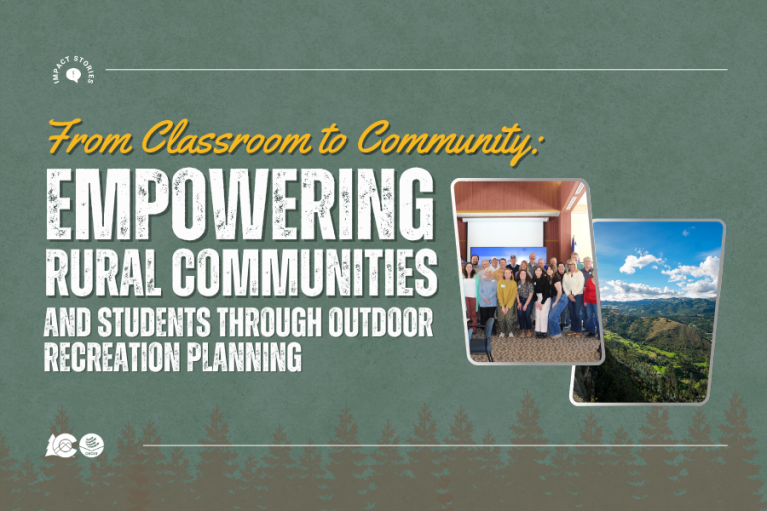Abigale Purvis joined the Masters of the Environment (MENV) program at the University of Colorado Boulder (CU Boulder) to specialize in Urban Resilience and Sustainability which focuses on creating strategies and policies that promote sustainability. With her background in urban park stewardship, Purvis pursued her masters to bridge her love for community-centered work and her passion for climate preparedness and resilience.
“I loved working in the urban park space and working closely with communities but found myself endlessly fascinated by all of the resilience decisions that my co-workers would make,” said Purvis. “For example, I was always looking over the shoulders of the horticulture team as they selected drought-tolerant native plants or the capital projects team as they conducted rounds of community feedback regarding the installation of new water misters to combat the urban heat island effect.”
Through a Building Community Capacity course, Purvis came across the perfect opportunity to gain hands-on consulting experience to support communities in complex decision making. The course, offered each spring, houses the Rural Technical Assistance Program (RTAP) which supports three rural Colorado communities each year to revitalize their main streets and create economic opportunities through outdoor recreation.
Seeing how outdoor recreation could strengthen rural economies, OEDIT's Rural Opportunity Office asked the Colorado Outdoor Recreation Industry Office (OREC) division to create a special program on the matter. Around the same time, CU Boulder pitched OREC an idea for a student-run project. This perfect timing led to RTAP, which took a federal model and, with help from the EPA and the Outdoor Recreation Roundtable, made it a state-specific, student-friendly program, building on the existing Recreation Economy for Rural Communities (RERC) program.
Purvis and her fellow classmates formed three teams to work with La Junta, Beulah, and Keystone, Colorado. They helped Keystone develop a community action plan by forming a steering committee, and facilitating a planning session and community workshop. The resulting plan details the community’s vision and strategies to enhance outdoor recreation and main street projects.
On location, Purvis and team helped facilitate the Keystone Community Visioning Workshop and noticed a deeply engaged, welcoming community with an infectious energy. At the community tour and workshop, teams led activities that helped the community imagine its future, figure out what works and what needs improvement, map out resources, and plan specific steps to reach their goals. This event showed how all their hard work in the class came together.
“The tour was a great chance to understand for ourselves the things that we had been hearing from the Steering Committee during our previous calls. By the end of the two days, we had clarified the community’s overall goals for the town, prioritized specific actions to support those goals, and created well-thought out next steps for those actions,” said Purvis. “We all left feeling very accomplished and energized for the next steps in the RTAP process. I’m so grateful for the opportunity to work on this amazing project and I’m excited to see all of the great things that Keystone will accomplish in the future!”
“This is the first opportunity that students get to meet their community point of contact and steering committee in person, and it’s so amazing to see how these relationships flourish over such a short time period,” said CU Boulder Teaching Associate Professor Natalie Ooi. “There’s something about being all together in a room that fast-tracks that relationship-building with all of the listening and groundwork that has been laid in the previous months, paying off!”
As one student mentioned in their program feedback, the experience helped them develop skills related to, “working on a close-knit team through tough situations, such as giving and receiving feedback and holding each other accountable.”
According to Matt Nuñez, Senior Program Manager at OREC who oversees RTAP, the workshops have consistently grown in effectiveness and engagement.
“What excites me most about this program is that it is fully customizable depending on community size and needs,” said Nuñez. “I'm grateful to our partners at CU Boulder, Colorado State University, and in each of our partner communities for their hard work to pull this program together!”
According to Professor Ooi, numerous former students credit the experience with helping them secure employment after graduation. “I’ve had students go into all sectors share with me that their experience facilitating and project-leading a community-driven process like this is what helped them secure their jobs in interviews and even prepare them for the work they are currently doing in their roles,” she said.
Purvis graduated in May 2025 and now works for the State of Colorado as the Climate Preparedness Manager at the Governor’s Office of Climate Preparedness and Disaster Recovery. She credits the Building Community Capacity course for providing her with necessary experience in facilitation, plan development, relationship building, resource navigation, and strategic planning which she utilizes everyday in her role.
“I’m so grateful to work in an environment where I can apply the skills I’ve gained in the MENV program towards my passion of helping prepare people for the impacts of a changing climate.”
The first two years of RTAP have resulted in a couple of early wins. In Leadville, the community has established an extensive destination stewardship program and is currently going through Dark Sky certification. In Cripple Creek, indirect impacts include the famous Ice Castles opening in the community, providing a new and exciting recreation opportunity for families around the Pikes Peak region. Implementation for this year's projects is already underway with the Colorado Tourism Office (CTO) providing guidance to Keystone on branding and messaging and Beulah residents organizing community tours for visitors.
Rooted in the U.S. Environmental Protection Agency’s RERC model, RTAP is made possible through the collaborative effort between OEDIT’s OREC division, CU Boulder, and Colorado State University (CSU) Extension. RTAP has a successful track record of assisting rural Colorado communities, including Cripple Creek, Hayden, Leadville, Huerfano County, Lake City, and Rangely/Dinosaur, in fostering economic growth through outdoor recreation and Main Street development for rural communities in Colorado.
